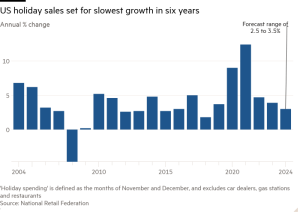British farming needs a clearer future
Unlock the Editor’s Digest for free
Roula Khalaf, Editor of the FT, selects her favourite stories in this weekly newsletter.
For the past week, alarm has been spreading across Britain’s shires. The new Labour government’s first Budget extended inheritance tax to farm property, in a move many in the farming industry and beyond warn could kill off the family holdings, often handed down through generations, that dominate UK agriculture. Farmers are planning what could be their biggest protest for years.
In reality, the change may cause less harm than critics fear. A more immediate threat to farm incomes may be accelerated cuts to EU-era subsidies that Labour also unveiled last week. But the way both measures were introduced betrays the often ad hoc approach from successive governments towards a sector that produces 60 per cent of what the UK eats, underpins a hefty food manufacturing industry, and manages large parts of the landscape. Britain needs to work out a far more holistic vision of farming, and the extent to which it merits special support.
Working farm estates in Britain have for decades been exempt from “death taxes” so they can be passed on intact to the next generation. The exemption sucked in money from wealthy investors, pumping up land prices. That hits small family farmers who must take on higher debt if they want to expand, and creates distortions between asset classes and loopholes that Britain’s cash-strapped government wants to close.
Wealthy landlords will surely cope. Many family farms will fall below the tax threshold or, through careful planning such as passing on assets at a younger age, may be able to avoid it. But even that planning creates further headaches and costs for cash-poor farming businesses squeezed by the buying power of retailers and the food industry. UK farmers, like EU counterparts, are already bowed by rising feed, fuel and fertiliser costs, extreme weather, and demands to shift to lower-carbon and more sustainable farming.
The Covid pandemic and return of war to Europe have brought home the importance of food security. Sustaining a scarcely profitable domestic industry in the face of cheaper imports, though, means consumers must either pay more at the till or in taxes to fund state support. Farmers are meanwhile being asked to “rewild” parts of the countryside and contribute to commitments to preserve land for nature.
Brexit provided an opportunity to reconcile some of these objectives. In what it billed as the “biggest change in agricultural policy in half a century” the Conservative government in England set out to phase out EU subsidies that pay farmers based on land area and replace them with Environmental Land Management schemes. These pay farmers for delivering green goals as well as food production. The aim was for farms to be profitable and economically sustainable “without subsidy”.
Farmers complain, however, that the Conservatives’ replacement schemes were badly designed and implemented. Despite pledges, no impact assessment has been carried out, and no land use framework for England drawn up — determining how much to devote to, say, food production versus emissions absorption. Now farmers that warn Labour’s accelerated phaseout next year of a legacy scheme that replaced EU direct payments will hit incomes for many, though the government says England’s overall farm support budget will be protected.
Lagging G7 counterparts in some productivity measures, UK farming would benefit from consolidation and investment in new techniques and technologies, where the geography is propitious. But if Britain wants to save its farmers, it needs to work out what it wants them to be and do, then design policies fit for the task.
#British #farming #clearer #future



